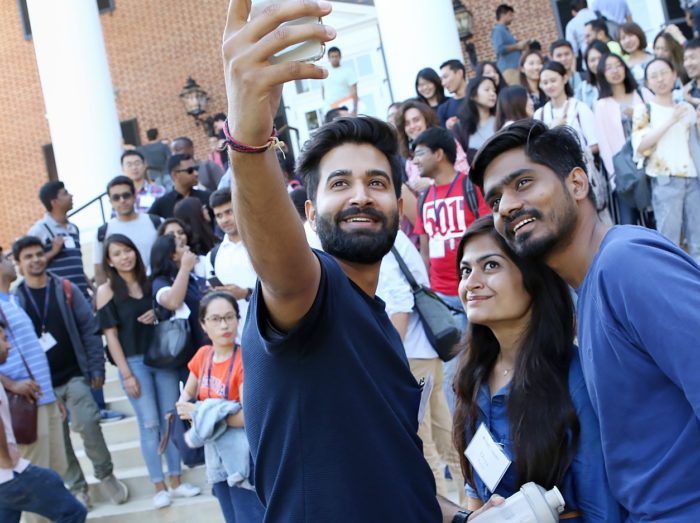At Darden, international students are valued members of our community, and in a typical class, roughly one-third of our full-time MBA students will hail from a country other than the United States. In an Executive MBA program cohort, there will usually be 10 or more countries, represented by citizenship.
Plan, Plan, Plan
As we have noted elsewhere, the more time you can give yourself to work on your application, the better. This will enable you to be more intentional as you develop your narrative, but it will also allow you to meet any additional documentary requirements (for example, English proficiency tests, transcript translation, etc.) without having to delay your application or shift your round.
We have a helpful Application Guidelines webpage, but we also encourage you to make note of any school-specific requirements in the spreadsheet you’ve created to keep track of your business school research. Different schools have different requirements – particularly when it comes to international students – and having all this information in one place will help you stay organized as the application process heats up.
Bachelor’s Degree
File under: FAQ. International applicants are required to hold a college or University degree equivalent to a four-year, U.S. baccalaureate degree. However, Darden will also recognize undergraduate degrees earned in only three years of study.
Pro Tip: We have a webpage expressly for international applicants. Here you will find additional information about academic requirements, interviews, transcripts, and the University’s English proficiency requirement.
English Proficiency Test Requirement
Are you from a country where English is not the native language? If so, you will want to review the University of Virginia’s English proficiency requirements closely as you plan for the application process.
The University of Virginia accepts both TOEFL and IELTS, and, as with other standardized tests, your score will need to be valid as of the deadline date of the round in which you apply. As this is a University-level directive, we are unable to waive this requirement, even for international applicants who have spent significant time living and working in the United States.
Here is a quick series of questions to help you determine if you will need an English proficiency test score as part of your application materials.
- Was English the language of instruction at your college or University? If YES, an English proficiency test score is NOT required. If NO, the next question to consider is:
- Did you complete a graduate or advanced degree in which English was the language of instruction? If YES an English proficiency test score is only recommended.
If your answer to both of the above questions is NO, you will need to include a TOEFL or IELTS score with your application.
Pro Tip: You will be asked to confirm if English was the language of instruction for any school or institution you enter in the Academic History section of the application.
You will upload your TOEFL or IELTS in the Test Scores section of your application, and it is worth noting there is no minimum or required score for these tests. As with our review process generally, the Admissions Committee will evaluate your score(s) within the full context of your application.
About the Darden Interview
If you participate in an interview, this conversation is an additional opportunity for you to demonstrate your English language proficiency. In fact, in the interview evaluation form, there are multiple fields where your interviewer will be asked to assess your communications and, if you are a non-native English speaker, your language skills.
For our applicants for whom English is a second or other language, we know conducting an interview in English can be particularly stressful. In addition, because interviews are being hosted remotely via Zoom, it can be tempting to work from a pre-drafted script or have written answers close at hand for quick reference.
While we recommend practicing and preparing for your Darden interview, you should not read during this interaction. As noted, this is intended to be a conversation, and, believe it or not, it will be obvious to your interviewer if you start to read or review notes (tell-tale signs include eye drift and voice inflection) or even if there is another person coaching or directing your responses.
Your interviewer will have many goals for this 30-35 minute conversation – to learn more about your story, your motivation for pursuing an MBA, why Darden, your short-term and long-term goals, to name a few. However, the interview is also an opportunity for her to assess important characteristics that may be more difficult to judge from the application alone – for example, your communication skills, your presence and your ability to think on your feet.
Darden is a communication-based MBA experience, and we want to make sure you are ready for an extemporaneous, discussion-based classroom environment. The interview can be particularly helpful when making this assessment, and we encourage you to make the most of it.
Transcript Translation
Another potential speed bump! If any of your transcripts are not in English, you will need to make arrangements to have your transcripts translated. All translations must be complete and literal versions of the original records, and you should have the translated transcript, along with the original document, sent directly to our office. We will upload these materials to your file.
Pro Tip: Even for transcripts that are in English, it can sometimes be challenging for our Admissions Committee to understand an applicant’s relative academic performance. If possible, make sure your transcript includes a key or some detail about the institution’s grading scale. You can even use the Additional Comments section or your resume to provide context regarding your GPA, graduation rank or coursework.
Making Connections
Networking can be a less familiar concept for some of our international applicants. However, the business school research process is a great opportunity for you to test drive this important skill. After you’ve done your preliminary research into each of your target schools, we recommend connecting with a few students and alumni to give some more personal depth to what you’ve gleaned from websites, rankings and third-party sources.
When it comes to this kind of outreach, LinkedIn is a great place to start, but we also recommend checking out Darden’s student organizations listing. There are a number of international student-related clubs – Asia Business Club at Darden (ABCD), Darden African Business Organization (DABO), Daren South Asia Society (DSAS), Global Business and Culture Club (GBCC), Latin American Student Association (LASA), Middle Eastern Islamic Student Association (MEISA) – and the leadership boards for these groups are an easy and convenient way for you to connect with students who share your background.
But remember: You will want to have a strategy for your student and alumni outreach. The clearer you are about your goals for these conversations, the more you can be sure you are maximizing these interactions. Check out our earlier post, Networking During the Application Process
Be sure to consult the Latest News regularly for the most updated news releases and media hits. Check out faculty thought leadership published on Ideas to Action. And stay connected with us via social media: Facebook, Instagram, LinkedIn, Twitter, WeChat.





